- europages
- >
- COMPANIES - SUPPLIERS - SERVICE PROVIDERS
- >
- crushing and grinding machinery
Results for
Crushing and grinding machinery - Import export
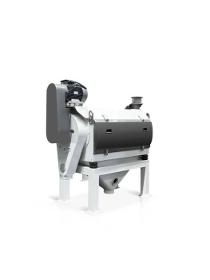
ROBINSON CO.
Turkey
It is designed for separating flour particles stuck on bran and remaining in bran in flour and semolina factories. The flour and ash particles in the bran are separated and brought into the system and the efficiency is increased and efficiency is provided.
Request for a quote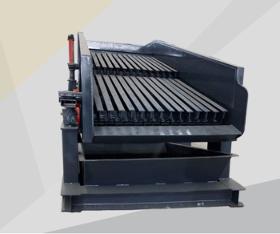
NOVELTY STEEL
Turkey
Grizzly screens are typically constructed by welding steel rails, rods, or bars into grids with a specific pattern. The selection of rails can vary in size, ranging from about 7.4 kg/m to approximately 225 kg/m. These rails generally run parallel to each other along the entire length of the screening surface. The spacing between the rails typically range from 5 to 200 mm. To facilitate the smooth flow of materials, the openings are often tapered, with the top being wider than the bottom. Heavy-duty grizzly bars are commonly cast from manganese steel and feature double tapers. These grizzly screens are designed to receive large lumps of ore from sources such as railroad wagons, tipper cars, and other bulk material handling systems that discharge materials from considerable heights. As a result, they are constructed to be exceptionally robust to withstand the impact and handling of heavy materials.
Request for a quote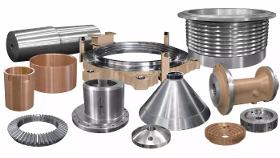
NOVELTY STEEL
Turkey
Cone Crusher Spares: *Cone Mantle Liner *Hopper Assembly *Oil Flinger *Countershaft Bushing *Frame Seat Liner *Frame Pin Bushing *Upper Thrust Bearing *Socket Liner *Eccentric Bushing *Head Upper Bushing *Head Lower Bushing *Main Shaft *Adjustment Ring *Counterweight Liner *Feed Cone *Torch Ring Jaw Crusher Spares: *Crusher Jaw Block *Crusher Jaw Pitman *Jaw Plate *Crusher Jaw Wedge *Crusher Mast Bed *Pitman *Crusher Jaw Casting *Wedge Bolt Tertiary Crusher Spares: *Tertiary Bed *Tertiary Rotor *Tertiary Palette *Tertiary Shaft *Tertiary Rib VSI *Vertical Shaft and Sleeve *Vertical Shaft Rotor *Vertical Shaft Diamond *Vertical Shaft Distributor *Vertical Shaft Feed Eye Ring
Request for a quote
XIAN HUAN-TAI TECHNOLOGY & DEVELOPMENT CO., LTD.
China
Jaw plate and Side plate for Jaw crusher; Mantle, Concave for Cone Crusher; Blow bar and Hammer for Impact Crusher and Hammer/Metal crusher; Roller and Ring for Raymond Mill; Roller Liner and Disc Liner for Sand making VSI Crusher, Chocky bar and Wearing button for Excavator, which is in the material of High Manganese Steel Mn13Cr2/ Mn14Cr2/Mn17Cr2/Mn18Cr2/Mn22Cr2; High Chrome White Iron Cr20/Cr22/Cr24/Cr26, and its with Mo, Ni, Re, Ceramic, Alloy, Bi-metal etc wear-resistant materials. And HUAN-TAI products support for Shanbao, SBM, Liming, Shibang, Zenith, Metso, Sandvik, Barmac, Trio, TEREX, Pegson, Powerscreen, Kleemann, MINYU, Symons, Hazemag, Cedarapids, McClosey, Keestrack, Telsmith, Russian brands and other famous brands machine. We also can produce the wearing spare parts as per customers’ own drawings
Request for a quote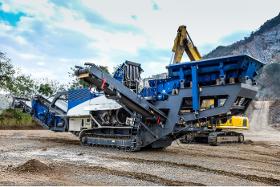
NOVELTY STEEL
Turkey
Mobile crushers are mounted on a self-propelled steel platform equipped with wheels, crawlers, or pneumatic pads for movement. The platform incorporates all necessary auxiliary equipment and subsystems for crusher operation. They operate independently on the mine floor. Placed at the working face, the crusher minimizes the need for truck or front-end loader transport, with planned moves occurring between one day and one week. Installation of mobile crushing plants is advantageous under specific conditions; * A clear and undisturbed geological situation, * Straight and long benches for shiftable face conveyor installation, * Long-term mine planning for various conveyors. The benefits of fully-mobile crushers include * Elimination of truck transport * Reduced personnel requirements * Avoidance of high truck maintenance costs * Decreased mine traffic * Overall improvement in mine safety.
Request for a quote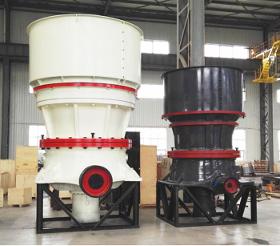
NOVELTY STEEL
Turkey
The Cone crusher has a smaller crushing chamber. Therefore, break the rocks by tightening them between the rotating spindles. In addition, these spindles are completely covered with a sturdy mantle and a manganese bowl liner covers the hopper. When the rocks enter between the lining of the bowl and the mantle, the rocks are tightened. The broken rock pieces fall to the next position where they break again. Then, the same process repeats until the broken pieces become small enough to pass through the narrow opening in the bottom of the conical crusher. Novelty Steel supplies; * Cone Crushers * Jaw Crushers * Gyratory Crushers * Impact Crushers
Request for a quote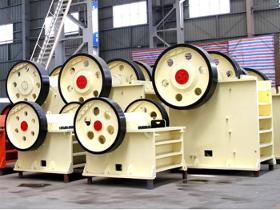
NOVELTY STEEL
Turkey
The distinguishing feature of the jaw crusher is that it has two jaws which are placed with an acute angle between them and the two open and close as animal jaws do. The jaws are such that one is fixed while the other is hinged, swinging relative to the immobile jaw. Jaw crushers are classified based on the way the swinging jaw is pivoted. In the Blake Jaw crusher, the swinging jaw is pivoted at the top and thus it has an ore receiving area that is fixed and an exit or discharge opening that is variable. For the Dodge Toggle Jaw crusher, on the other hand, the pivoting is at the bottom making it to have a receiving area that varies and a delivery opening that is fixed. Jaw crushers are rated on the basis of the receiving areas, which are the product of the width of the jaws and the gape. The gape is the distance at the feed opening between the jaws. For instance, a 2130 × 1680 mm jaw crusher specification means that the jaw crusher has a width of 2130 mm and a gape of 1680 mm.
Request for a quote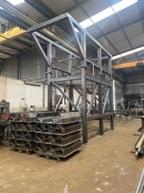
MPN - MECÂNICA DE PRECISÃO DO NORTE, LDA.
Portugal
DESIGN - MANUFACTURE - INSTALLATION - COMMISSIONING COMPLETE INSTALLATIONS MINING - QUARRYING - RECYCLING
Request for a quote
POLYGONMACH MAKINE SANAYI VE TICARET LTD STI
Turkey
700-1000 TPH Basalt Crushing and Screening Plant is made for basalt aggregate producing at high production through output. Basalt Crushing and Screening Plants can be used for many different purposes in a wide range of sizes, according to the third stage of the modern performance-made machine and machinery. These plants have a reinforcement of strong basalts that are characteristic of very great volcanic stones of high durability. These plants basically break large boulders of basalt rocks into smaller chips and thereafter screen them to generate high-quality aggregate, suitable for a large variety of applications in construction, infrastructure development, and industrial projects. These plants, by processing basalt rocks, play an important role in delivering strong materials needed for construction projects where durable and reliable aggregates are required to support heavy loads and environmental conditions.
Request for a quote
POLYGONMACH MAKINE SANAYI VE TICARET LTD STI
Turkey
The 500-750 TPH Basalt Crushing Screening Plant is an industrial installation designed for processing big rocks made of basalt into varied dimensions of basalt aggregates within a range of 500/750 tonnes each hour. Basalt is a pretty dense volcanic rock, durable, and strong, which is why it is at the top of the list of items used in construction works that require strenuous and long-lived materials. These plants are highly equipped with superior machinery and equipment required to effectively and more efficiently process huge loads of basalt, which is reduced to smaller sizes that mainly make up the need for various construction and industrial applications. The processed basalt aggregates are applied to a wide range of projects, including those for road construction, infrastructure development, and the production of concrete and asphalt products.
Request for a quote
POLYGONMACH MAKINE SANAYI VE TICARET LTD STI
Turkey
350-500 tph basalt crushing and screening plants have been introduced in special place, thanks to its ability to process the basalt and produce the required aggregate for making various kinds of construction work and meets an operating capacity of 350-500 tons per hour. It is associated with machinery and equipment that are in operation for basalt, one of the toughest durable volcanic stones. These plants are mainly designed to crush large basalt stones into smaller fragments and then screen them in a way to prepare good quality aggregates that are extremely versatile and suitable for a wide range of construction, infrastructure, and industrial projects. By helping to produce robust materials efficiently for the crushing of basalt, these plants correspond to construction projects requiring strong, dependable aggregates to survive heavy loads and harsh environmental conditions.
Request for a quote
POLYGONMACH MAKINE SANAYI VE TICARET LTD STI
Turkey
The 250-350 TPH Basalt Crushing and Screening Plants are purposely created for producing a variety of aggregate sizes at throats ranging between 250 and 350 tons per hour. These plants require the availability of specially designed machinery and equipment concerned with the processing of basalt, a resilient volcanic stone with strength and durability. Such plants are mainly aimed at increasing the crushing rate of basaltic stones by reducing them into smaller fragments and screening them effectively so as to produce fine quality and graded aggregate, suited in dimension to mainly these general classes of constructions, infrastructure development, and industrial projects. Properly processed basalt materials ensure a complete solution in the routing of materials, very important in the construction of strong buildings whose degree of strength and toughness is highly reliable.
Request for a quote
POLYGONMACH MAKINE SANAYI VE TICARET LTD STI
Turkey
A 150-250 tph Basalt Crushing and Screening Plant is a progressive facility that processes 150-250 tons of basalt stone at input sizes of 600 mm, into end products of 0-5mm, 5-12 mm, 12-24 mm. These are appropriate for road constructions as well as commercial purposes. These plants are generally designed to crush large basalt rocks into smaller fragments and screen them to produce high-quality aggregates suitable for applications in construction, infrastructure development, and industrial projects. Manufacturing robust materials by means of efficient basalt processing, these plants are important contributors to the various construction endeavors that must be carried with the utmost certainty in mind.
Request for a quote
POLYGONMACH MAKINE SANAYI VE TICARET LTD STI
Turkey
100-150 tph Basalt Crushing and Screening Plants are specialized facilities designed for processing basalt stones into various sizes of aggregates at a throughput capacity ranging from 100 to 150 tons per hour. These plants are equipped with machinery and equipment tailored for handling basalt, a durable volcanic stone known for its strength and versatility. The primary function of these plants is to crush large basalt stones into smaller fragments and then screen them to produce high-quality aggregates suitable for applications in construction, infrastructure development, and industrial projects. By efficiently processing basalt, these plants play a vital role in producing robust materials essential for various construction endeavors requiring resilient and reliable aggregates.
Request for a quote
POLYGONMACH MAKINE SANAYI VE TICARET LTD STI
Turkey
The 50–100 tph basalt crushing and screening plan is a plant that embodies facilities to screen and process basalt stones into a form with different stone sizes containing a capacity range from 50 to 100 tons per hour. These are plants designed scrupulously for taking extra care in handling the volcanic stone, basalt, which is known for its strength and durability. These plants primarily crush big stones of basalt into smaller pieces, after which they screen the materials that have come up with different sizes applicable in building, infrastructure, and industrial use. In essence, these plants produce high-quality aggregate that is used in projects that require materials to be equally strong and formidable.
Request for a quote
POLYGONMACH MAKINE SANAYI VE TICARET LTD STI
Turkey
A 40-60 TPH Basalt Crushing Screening Plant represents the optimal configuration in regard to crushing and curing basalt stones for a proper production facility. Basalt, the volcanic rock, with phenomenal indicators for stress, is filled with the unknown minerals, having extremely unique properties, hardness, and durability, making it easy to produce. These plants intake large stones of basalts, crush them into smaller fragments using a primary crusher, and then secondary crushers take over to refine the material in order to obtain aggregate fractions of certain sizes. The vibration screens classify the crushed basalts into different size fractions. This systematic approach guarantees that projects in construction, infrastructure, and landscaping that require top-quality basalt aggregates meet the final quality and usability required.
Request for a quote
POLYGONMACH MAKINE SANAYI VE TICARET LTD STI
Turkey
A basalt crushing and screening plant is a facility that meets the purposes of crushing and screening of basalt stones into aggregate sizes demanded on construction fields, infrastructure, and industry. Basalt is an igneous rock with basaltic features. Large pieces of basalt are broken into smaller ones in the process of crushing, made with such equipment as jaw crushers or cone crushers. After the primary crushing stage, it is separated by sifting in order to segregate the particular material according to size, enabling the production of different sizes of the same material. The efficiency of separation for these highly intermixed crushed basalt materials, in different fractions by size, by the vibrating screens makes them an integrative screen in the process. It is t he enormous product that comes out from basalt\toc crushing and screening plants. It can be used as high-quality aggregate for making concrete, building highways, making gardens, and other constructions that need firm an
Request for a quoteDo you sell or make similar products?
Sign up to europages and have your products listed

POLYGONMACH MAKINE SANAYI VE TICARET LTD STI
Turkey
500-750 tph Riverstone Crushing and Screening Plants are advanced facilities designed to process Riverstones into premium stone aggregates within a throughput capacity range of 500 to 750 tons per hour. These sophisticated plants consist of primary crushing equipment, screening machinery, and conveyors specifically configured to handle Riverstone materials efficiently. The primary crushing stage involves robust crushers such as jaw crushers, cone crushers, or impact crushers that break down large Riverstones into smaller fragments, preparing them for subsequent processing within the specified high throughput capacity. Following primary crushing, the material is meticulously screened using vibrating screens to classify the Riverstone aggregates into different fractions based on size requirements. This precise screening process guarantees that the final aggregates meet strict quality standards necessary for various construction, landscaping, and industrial applications.
Request for a quote
POLYGONMACH MAKINE SANAYI VE TICARET LTD STI
Turkey
350-500 tph Riverstone Crushing and Screening Plants are specialized facilities designed to process Riverstones into high-quality stone aggregates within a throughput capacity range of 350 to 500 tons per hour. These plants consist of essential components such as primary crushing equipment, screening machinery, and conveyors tailored to efficiently handle Riverstone materials. The primary crushing stage involves crushers like jaw crushers, cone crushers, or impact crushers that break down large Riverstones into smaller fragments, preparing them for subsequent processing within the specified throughput capacity. Following primary crushing, the material is directed to screening equipment, such as vibrating screens, which classify the Riverstone aggregates into different fractions based on size requirements. This careful screening process ensures that the final aggregates meet stringent quality standards essential for various construction, landscaping, and industrial applications.
Request for a quote
POLYGONMACH MAKINE SANAYI VE TICARET LTD STI
Turkey
250-350 tph Riverstone Crushing and Screening Plants are specialized facilities designed to process Riverstones into high-quality stone aggregates within a throughput capacity range of 250 to 350 tons per hour. These plants consist of essential components such as primary crushing equipment, screening machinery, and conveyors tailored to handle Riverstone materials efficiently. The primary crushing stage involves crushers like jaw crushers, cone crushers, or impact crushers that break down large Riverstones into smaller fragments, preparing them for subsequent processing within the specified throughput capacity. Following primary crushing, the material is directed to screening equipment, such as vibrating screens, which classify the Riverstone aggregates into different fractions based on size requirements. This meticulous screening process ensures that the final aggregates meet stringent quality standards necessary for various construction, landscaping, and industrial applications.
Request for a quote
POLYGONMACH MAKINE SANAYI VE TICARET LTD STI
Turkey
150-250 tph Riverstone Crushing and Screening Plants are specialized facilities designed to process Riverstones into high-quality stone aggregates within a throughput capacity range of 150 to 250 tons per hour. These plants consist of essential components such as primary crushing equipment, screening machinery, and conveyors tailored to handle Riverstone materials efficiently. The primary crushing stage involves crushers like jaw crushers, cone crushers, or impact crushers that break down large Riverstones into smaller fragments, preparing them for subsequent processing within the specified throughput capacity. Following primary crushing, the material is directed to screening equipment, such as vibrating screens, which classify the Riverstone aggregates into different fractions based on size requirements. This meticulous screening process ensures that the final aggregates meet stringent quality standards necessary for various construction, landscaping, and industrial applications.
Request for a quote
POLYGONMACH MAKINE SANAYI VE TICARET LTD STI
Turkey
The 350-500 tph Granite Crushing and Screening Plant is one of the large full-featured plants unveiled for the market, designed to generate quality granite aggregate, at processing intensity levels from 350 to 500 TPH. These plants come championed with primary crushers, secondary crushers, operating conveyors and feeders, vibrating screens, all gruesomely engineered for optimum crushing and screening effectively. The primary crushers are expected to reduce oversize granite rocks into properly sized fragments for processing to produce more value-added building material. The secondary crushers are for a finer aspect of anything so that they reach the ideal size aggregate, and the vibrating screens perform an accurate classification of the crushed stone into different fractions, by size. Such stringent screening ensures that the end aggregates are produced of remarkable quality for use in various kinds of construction work and infrastructural projects as well as in many industrial applica
Request for a quote
POLYGONMACH MAKINE SANAYI VE TICARET LTD STI
Turkey
100-150 tph Riverstone Crushing and Screening Plants are special plants that are intended for processing Riverstones into aggregate in-crushed-stone-quality needs within a throughput capacity range of 100 to 150 tons per hour. The plants would have primary crushing equipment, screening tools, conveyors—all critical units designed specifically to handle Riverstone material efficiently. Primary crushing includes crushers like jaw crushers or cone crushers that break the larger size of Riverstones into smaller pieces in preparation for the subsequent processing stages, specified in the throughput capacity. The screened material through primary crushing goes to screening equipment, such as vibrating screens, whose task is to classify the Riverstone aggregates by size into fractions. All this is an outcome of rigorous screening processes that lead to the making of aggregates in strict adherence to quality standards, which are put to use in countless construction, landscaping, and industrial
Request for a quote
POLYGONMACH MAKINE SANAYI VE TICARET LTD STI
Turkey
The capacity range to process Riverstones in designing 50-100 tph Riverstone Crushing and Screening Plants is up to high-quality aggregates, sometimes between 50 and 100 tons per hour. This plant works by first feeding raw Riverstones into primary smashing equipment, such as jaw smashers or impact smashers, which do play a very important role in the smashing of the bigger stones of Riverstones into smaller fragments of stone at the start of processing. The primary crushing stage is a very important part of the process for producing raw material to be fed into the later stages of the process, with a specified range of throughput capacity, to ensure that the river stones are well processed into the premium stone aggregates required for construction, landscaping, and industrial applications. Screening is then done as the next stage following primary crushing; this may be done mainly using vibrating screens, thus classifying the riverstone aggregates into the required fractions based on si
Request for a quote
POLYGONMACH MAKINE SANAYI VE TICARET LTD STI
Turkey
Riverstone is commonly a natural stone, typically located in or around rivers and streams. Its large nature can best be categorized as smooth and round. Over some time, the waters move over them and these stones are polished, and hence their common shape or texture. The various distinct differences in them include sizes, colours and compositions. Gray, tan, brown, and red are the common colour shades for riverstones. Being naturally smooth-surfaced with a luring appearance makes them quite popular for use in landscaping and beautification. Depending on the setting, be it in a path, edge of a garden, or a water feature, riverstones will bring an element of natural beauty to the setting generally creating peace and proper organic feel in an outdoor space.
Request for a quote
POLYGONMACH MAKINE SANAYI VE TICARET LTD STI
Turkey
A 40-60 TPH Limestone Crushing and Screening Plant is a facility designed to process limestone raw material into high-quality aggregates with a throughput capacity of 40 to 60 tons per hour. These plants are specifically designed to cater to the demands of different industries like construction, road building, and landscaping, where such high-quality limestone aggregates are required. It usually hosts primary crushing equipment, screening machinery, and conveyors—all designed to handle limestone material conveniently. The initial processing of larger limestone rocks into smaller, more workable fragments is done with primary crushers like jaw crushers and cone crushers. This is very important for the sizing of the raw limestone material, required for further processing, into a size that is ready for making the final product, as per the defined size and quality requirements.
Request for a quote
POLYGONMACH MAKINE SANAYI VE TICARET LTD STI
Turkey
Limestone is effectively a sedimentary rock primarily consisting of calcium carbonate, typically in the form of the mineral calcite. Over vast ages, this rock builds up from depositional formation of marine creatures such as shellfish, coral, and algae that accumulate, sowing up as solid rock. Much of the time, these rocks contain fossils. Moreover, visible formation in terms of layers further bears record to its formation from the ocean's bed. Limestone has been used in construction since time immemorial owing to its high content of calcium. It is greatly durable, relatively easy to cut and carve, and provides an aesthetically pleasing material fit for building purposes of every type, from monuments to pavement stones. Adapted in highly ornate designs and sculptures, it is smooth in texture and beautiful in its coloration, thus giving a soft but timeless material for the architect or the builder.
Request for a quote
POLYGONMACH MAKINE SANAYI VE TICARET LTD STI
Turkey
The 700-1000 TPH dolomite crushing screening plant shall be a high-capacity industrial plant built to crush dolomite ore, which can produce all the required aggregates for construction projects. The term "TPH" means how many tonnes of dolomite ore the plant can get through in an hour, which is between 700 to 1000 tonnes per hour. This capability makes it be a core element in vast construction projects that require dolomite aggregates continuously. Dolomite, being of the composition calcium magnesium carbonate, is an essential material for construction, more so in the manufacture of concrete aggregates, road base materials, and other important building resources. These plants thus ensure that dolomite is well processed and sorted out to suit the specifications of construction applications.
Request for a quote
POLYGONMACH MAKINE SANAYI VE TICARET LTD STI
Turkey
A 500-750 TPH Dolomite Crushing Screening Plant is a technology-driven large processing facility meant to provide high-throughput dolomite ore processing into different sizes of aggregates against use in the construction field. The abbreviation "TPH" stands for "tonnes per hour," and it means a plant of this kind can process from 500 to 750 tonnes of dolomite ore every hour. Dolomite plays a key role as a material in the construction industry, mostly produced into concrete aggregates and road base materials, among others of importance. These plants are important for the crushing and screening of dolomite ore into various sizes that would be needed for any specified construction project by providing a steady supply of high-quality aggregates, which are essential in a broad range of applications in the entire construction industry.
Request for a quoteResults for
Crushing and grinding machinery - Import exportNumber of results
116 ProductsCountries
Company type